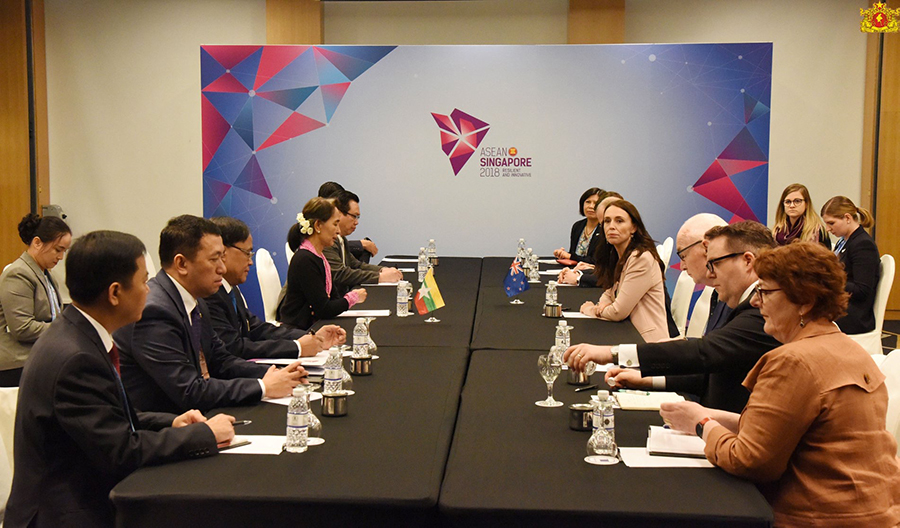YANGON—New Zealand’s prime minister offered to assist Myanmar’s state counselor’s efforts in finding resolutions to the Rohingya crisis during a bilateral meeting held during the ASEAN Summit in Singapore this week. The support came amid mounting international pressure—including the recent revoking of a human rights award from Amnesty International—on the Myanmar leader over her handling of the Rohingya issue.
At the ASEAN and East Asia Summit on Wednesday, the pair had a brief meeting just before the state counselor’s met US Vice President Mike Pence who issued the United States’ strongest rebuke against Daw Aung San Suu Kyi yet.
New Zealand’s prime minister Jacinda Ardern said her country shares the international community’s concern on Rakhine State’s security and development and the ongoing Rohingya repatriation process but also raised New Zealand’s willingness to assist and to help find a resolution.
“We, of course, share the concern of the international community around what has happened in Rakhine State, and the ongoing displacement of the Rohingya,” Ardern said.
She said New Zealand would raise human rights concerns continually but is always willing to help Myanmar.
More than 700,000 Rohingya have fled Myanmar for neighboring Bangladesh since last August, as a result of the Myanmar military’s clearance operations which followed attacks by Arakan Rohingya Salvation Army (ARSA) on military and security outposts in northern Rakhine State.
Daw Aung San Suu Kyi’s government has faced accusations of whitewashing war crimes committed by the military in Rakhine, Shan and Kachin states, according to the UN fact-finding report released in August this year.
The report said the state counselor has not used her de facto position as head of government, nor her moral authority, to stem or prevent the unfolding events or seek alternative avenues to meet her responsibility to protect the civilian population.

Daw Aung San Suu Kyi also faced strong condemnation during the ASEAN Summit during which she met with a number of country leaders who brought up the military’s persecution under the government she leads. Just one day into the summit, Amnesty International officially withdrew her Ambassador of Conscience award, the highest honor awarded by the rights group, for what their statement said is a shameful betrayal of the values she once stood for.
Malaysia’s prime minister Mahathir Mohamad said Daw Aung San Suu Kyi was “trying to defend the indefensible,” and that he was very disappointed by her failure to defend the Rohingya. In a meeting which followed that with New Zealand’s prime minister, US vice president Mike Pence told Daw Aung Suu Kyi that the persecution by Myanmar’s military was “without excuse.”
Daw Aung San Suu Kyi responded, “We can say that we understand our country better than any other country does. And I’m sure you will say the same of yours, that you understand your own country better than anybody else does.”
On Thursday, Daw Aung San Suu Kyi held a meeting with China’s premier Li Keqiang who said his country will continue to support the Myanmar government’s efforts to protect domestic stability and their approach in resolving the Rohingya issue.
On the same day, Bangladesh and Myanmar were to start the repatriation process of the first batch of verified displaced persons. Instead, a group of Rohingya held a protest saying they would refuse to return to Myanmar without being granted official citizenship. The Myanmar government has said no refugees have returned yet but that the repatriation process is still open.
According to New Zealand media reports, Ardern said she did not face any defense from the state counselor during the meeting and that they shared concerns over the Rohingya crisis.
“There’s no doubt that the situation is complex, incredibly complex,” Ardern is quoted in a New Zealand media report. “But for international actors, it’s all about making a position on those human rights issues heard and then seeing what we can do to facilitate support.”

















